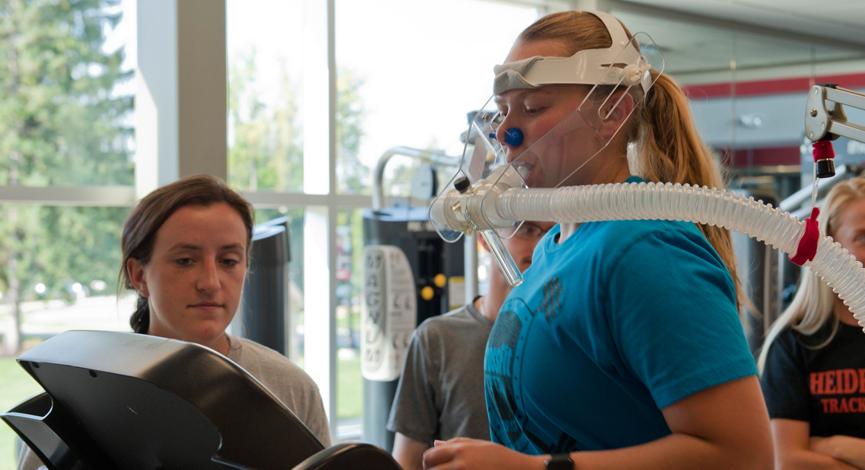
When she graduates, Maddy Hines will be proficient in working with a metabolic cart and administering VO2 Max testing. She’s learning those skills hands-on, and they’ll be very valuable in her planned career as an occupational therapist.
Maddy is among a core group of upperclass students who switched majors to Exercise Science, Heidelberg’s newest major launched just last fall. They are joined by a handful of first-year students, bringing the number of majors in the new program to 20.
Those are positive numbers for a program in its first year, said Dr. Morgan Kocher, the assistant professor of Exercise Science who came on board in August from the University of Hawaii to oversee the new major.
Timing is ideal for the new Exercise Science program, explained Jerry McDonald, assistant professor and chair of the Exercise and Sport Studies, who created the new major.
“The growth in demand for exercise specialists is related to two factors: One, the medical field has evolved significantly toward preventative medicine, of which exercise prescription is a major part. And two, the importance of exercise for special populations such as our increasing elderly population is being emphasized more than ever.”
Heidelberg’s Exercise Science curriculum includes preparation for the exercise and prescription testing for special populations, such as the elderly, those with obesity, diabetes, physical disabilities and other needs that require special accommodations.
“We’ve tried to get out and hit the ground running,” said Kocher, who’s excited about starting a program from the ground up. “It really is an awesome opportunity.”
One of the key components of the program will be the creation of a state-of-the-art lab that will rival labs found in other small-school settings. In the lab, students will have exposure to hands-on testing with athletes and teams – testing such as the VO2 (short for maximal oxygen uptake), metabolic analysis, resting energy expenditure, body composition, and peak power, speed and agility. Students will be able to apply the skills learned in the lab as they prepare for certifications in strength conditioning, exercise testing and prescription and personal training.
Maddie sees these skills as essential as she prepares for grad school and eventually a doctorate degree in occupational therapy. She’s already seeing personal growth in her confidence, compassion and competence. “Learning in a hands-on way is the best part for me,” she said. “One of my favorite experiences would be running a VO2 Max test on fellow students in class.”
While an individualized curriculum with built-in research opportunities is a big benefit, Kocher explained that Exercise Science students also will learn the flip side of testing. “While one is doing the testing, another is the ‘guinea pig,’” he said. “When they read tests, they’ll not only know what it means but what it feels like and describe it.”
Exercise Science graduates are required to complete a three-hour internship and those headed for careers in PT or OT will have some extra job shadowing hours to complete. In their final semester before graduation, eligible students will be qualified to sit for certification exams by the National Strength and Conditioning Association and the American College of Sports Medicine, the gold standards in the exercise and fitness world, McDonald explained.
Already, a number of the students are working with ‘Berg athletic teams on research for their capstone courses; topics include studying the effects of caffeine on athletic performance and a comparative examination of general fitness levels among teams.
“All of this really is exposure to what happens at the next level of health care,” Kocher said.
‘Berg students will be well positioned to seize opportunities in the growing health field with careers in exercise physiology, personal training, strength and conditioning, cardiac rehab, lifestyle management, corporate wellness, private health clubs and exercise programs for special populations.
With additional natural sciences coursework, some students could take the next step toward grad school in occupational therapy and physical therapy. “These two fields are experiencing tremendous growth that is projected to continue,” McDonald said, adding that the Exercise Science major will also serve as undergraduate preparation for Heidelberg’s new master’s program in Athletic Training.